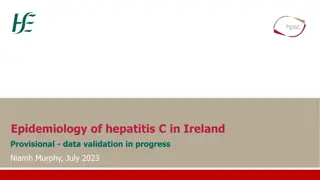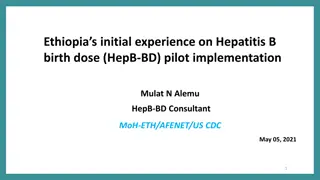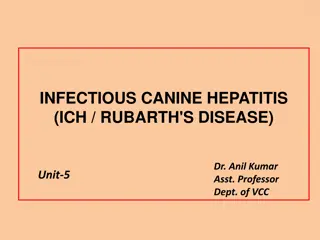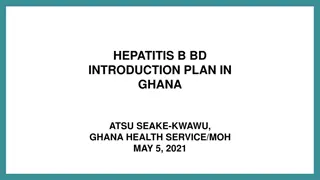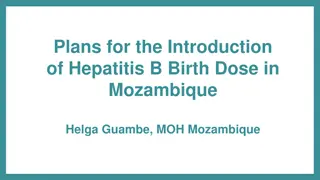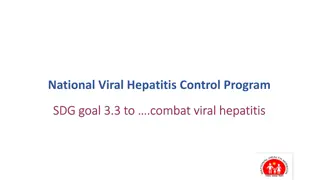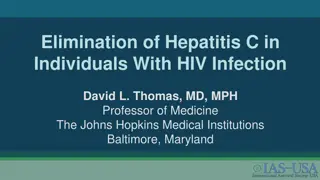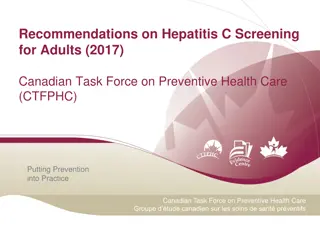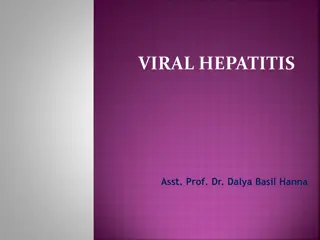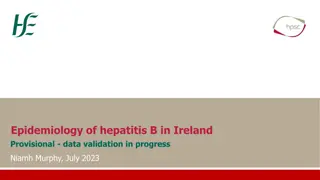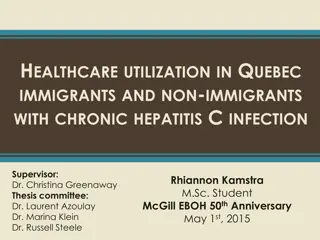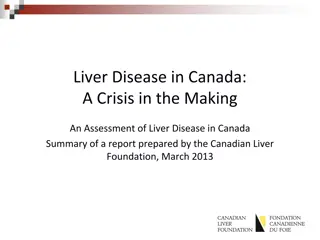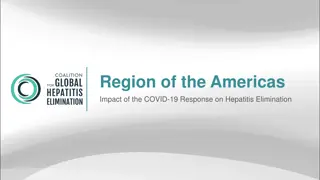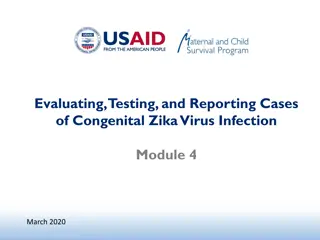Guidelines for Treating Chronic Hepatitis C Virus Infection
Clinical guidelines provide evidence-based recommendations for treating and curing chronic HCV infection in adults to improve treatment rates, reduce morbidity and mortality, and support the New York State Hepatitis C Elimination Plan. Recommendations include considerations in HCV treatment initiation, use of direct-acting antivirals, and contraindications for certain patient groups.
Download Presentation

Please find below an Image/Link to download the presentation.
The content on the website is provided AS IS for your information and personal use only. It may not be sold, licensed, or shared on other websites without obtaining consent from the author. Download presentation by click this link. If you encounter any issues during the download, it is possible that the publisher has removed the file from their server.
E N D
Presentation Transcript
Treatment of Chronic Hepatitis C Virus Infection in Adults www.hivguidelines.org APRIL 2023 NYSDOH AIDS Institute Clinical Guidelines Program
Purpose of This Guideline Purpose of This Guideline Provide clinicians with current clinical evidence-based recommendations on treating and curing chronic HCV to 1) increase the number of New York State residents treated for and cured of chronic HCV and 2) reduce the growing burden of morbidity and mortality associated with chronic HCV infection. Educate clinicians on safely and correctly prescribing anti-HCV medications. Educate clinicians on the effects of HCV infection during pregnancy and the risk of vertical HCV transmission during the perinatal period. Advise clinicians on the risks associated with HCV treatment in pregnant individuals. Provide evidence-based clinical recommendations to support the goals of the New York State Hepatitis C Elimination Plan (NY Cures HepC). APRIL 2023 NYSDOH AIDS Institute Clinical Guidelines Program www.hivguidelines.org
Current Direct Current Direct- -Acting Antivirals for Acting Antivirals for Treatment of Chronic HCV Treatment of Chronic HCV Protease inhibitors (-previrs): glecaprevir, voxilaprevir, grazoprevir NS5A inhibitors (-asvirs): ledipasvir, velpatasvir, pibrentasvir, elbasvir NS5B nucleoside polymerase inhibitor (-buvir): sofosbuvir APRIL 2023 NYSDOH AIDS Institute Clinical Guidelines Program www.hivguidelines.org
Recommendations: Recommendations: Considerations in HCV Treatment Considerations in HCV Treatment Before initiating antiviral therapy, clinicians should assess CrCl, HIV and HBV status, and the degree of fibrosis, among other factors. (A1) See the NYSDOH AI guideline Pretreatment Assessment in Adults With Chronic Hepatitis C Virus Infection. Clinicians new to HCV treatment should consult a specialist in treatment of liver disease or viral hepatitis when treating patients who: Have severe renal impairment (CrCl <30 mL/min) and/or are undergoing hemodialysis. (A3) Require retreatment after treatment failure of any DAA regimen. (B3) Clinicians should prescribe RBV with caution for patients with a CrCl <50 mL/min. (A1) If prescribed, a reduced dose of 200 mg per day is required. Non-RBV-containing regimens can be prescribed without dose adjustments for patients with CrCl 30 mL/min. APRIL 2023 NYSDOH AIDS Institute Clinical Guidelines Program www.hivguidelines.org
Recommendation: Recommendation: Contraindications for HCV Treatment Contraindications for HCV Treatment Clinicians should not prescribe RBV for treatment of the following patients: Female or male patients planning conception within 6 months of the last dose of RBV. (A2) Male patients who have pregnant partners. (A2) APRIL 2023 NYSDOH AIDS Institute Clinical Guidelines Program www.hivguidelines.org
Key Points: Key Points: HCV Treatment Goals and Considerations HCV Treatment Goals and Considerations Clinicians can increase their patients ability to understand treatment- related information and participate in decision-making if they communicate with clear, easily understood, jargon-free, and culturally sensitive language. Patient preferences are central to all treatment decisions. Cardiac disease and other comorbidities may affect a patient s ability to tolerate RBV-induced anemia and should be considered before initiating an RBV-containing regimen. APRIL 2023 NYSDOH AIDS Institute Clinical Guidelines Program www.hivguidelines.org
Recommendations: HCV Testing and Recommendations: HCV Testing and Management in Pregnant Adults Management in Pregnant Adults Clinicians should perform HCV testing in all patients who are planning to get pregnant (A2) or are currently pregnant (B3), and screening should be repeated with each pregnancy (B3). See the NYSDOH AI guideline Hepatitis C Virus Screening, Testing, and Diagnosis in Adults. Clinicians should advise pregnant patients diagnosed with chronic HCV (a positive HCV antibody test result and detectable HCV RNA) to defer treatment with DAAs until they are no longer pregnant or breastfeeding. (A2) If an individual with HCV becomes pregnant during DAA treatment, the clinician should Advise that the use of DAAs is not currently recommended during pregnancy because of insufficient safety data on the effect on the fetus. Discuss the risks and benefits of continuing treatment. Clinicians should refer pregnant patients diagnosed with HCV to a specialist experienced in managing HCV in pregnancy, e.g., hepatologist, gastroenterologist, infectious disease specialist, or high-risk obstetrician. (A3) APRIL 2023 NYSDOH AIDS Institute Clinical Guidelines Program www.hivguidelines.org
Recommendations: HCV Testing and Recommendations: HCV Testing and Management in Pregnant Adults Management in Pregnant Adults, continued If a pregnant patient with HCV has a substance use disorder, the clinician should provide or refer the patient for substance use treatment, including harm reduction services. (A3) See the NYSDOH AI guideline Substance Use Disorder Treatment in Pregnant Adults. Clinicians should advise pregnant and postpartum individuals with HCV monoinfection that HCV is not transmitted through breast milk and breastfeeding is considered safe. (B3) Clinicians should advise patients to discontinue breastfeeding if they have or develop cracked or bleeding nipples and to express and discard milk until the bleeding has resolved. (B3) Clinicians should refer infants born to mothers with HCV to pediatricians with experience in HCV care. (A3) See the CDC: Hepatitis C, Perinatal Infection 2018 Case Definition and the IDSA/AASLD: HCV in Pregnancy. APRIL 2023 NYSDOH AIDS Institute Clinical Guidelines Program www.hivguidelines.org
Recommendations: Contraceptive Use with Recommendations: Contraceptive Use with HCV Treatment Containing Ribavirin HCV Treatment Containing Ribavirin Before initiating RBV as part of an HCV treatment regimen in a patient of childbearing potential, clinicians should confirm a negative pregnancy test and advise patients to use 2 methods of birth control for the duration of DAA therapy and 6 months after completion. (A2) If a patient becomes pregnant while taking RBV, the clinician should discontinue the RBV. (A1) Contraindication: Clinicians should not prescribe RBV for any patient planning pregnancy within 6 months of the last RBV dose or any male patient with a pregnant partner. (A2) APRIL 2023 NYSDOH AIDS Institute Clinical Guidelines Program www.hivguidelines.org
Key Points: Key Points: HCV Screening During Pregnancy HCV Screening During Pregnancy All pregnant individuals should be tested for HCV during each pregnancy, along with hepatitis B virus and other suggested prenatal tests. If patients engage in ongoing high-risk behaviors during pregnancy, rescreening during pregnancy or the postpartum period is appropriate. See the NYSDOH AI guideline Hepatitis C Virus Screening, Testing, and Diagnosis in Adults. APRIL 2023 NYSDOH AIDS Institute Clinical Guidelines Program www.hivguidelines.org
Recommendations: Recommendations: Recommended DAA Treatment Regimens Recommended DAA Treatment Regimens Clinicians and patients should choose an anti-HCV regimen based on the pretreatment assessment and any previous HCV treatment. (A2) See the NYSDOH AI guideline Pretreatment Assessment in Adults With Chronic Hepatitis C Virus Infection. If a regimen that includes weight-based RBV is prescribed, clinicians should dose as follows (A1): <75 kg: RBV 400 mg once daily plus 600 mg once daily (total daily dose: 1,000 mg) 75 kg: RBV 600 mg twice daily (total daily dose: 1,200 mg) In patients with genotype 3 HCV and compensated cirrhosis, clinicians should perform NS5A RAS testing before initiating therapy. (A2) Clinicians new to HCV treatment should consult a specialist in treatment of liver disease or viral hepatitis when retreating patients in whom any prior DAA treatment has failed. (B3) Failure is defined as detectable HCV RNA 12 weeks after the conclusion of HCV treatment. APRIL 2023 NYSDOH AIDS Institute Clinical Guidelines Program www.hivguidelines.org
Key Points: Key Points: Choosing an Anti Choosing an Anti- -HCV Treatment Regimen HCV Treatment Regimen The choice of regimen should be based on individual pretreatment assessment findings, HCV treatment history, and insurance coverage. The recommended regimens within each list are in alphabetical order, not in order of preference; no single regimen is recommended over another within each list of options. APRIL 2023 NYSDOH AIDS Institute Clinical Guidelines Program www.hivguidelines.org
Recommended Oral DAA Regimens for Recommended Oral DAA Regimens for Adults With Chronic HCV Adults With Chronic HCV Drug/Combination Trade Name Glecaprevir/pibrentasvir Mavyret Ledipasvir/sofosbuvir Multiple brands Sofosbuvir/velpatasvir Multiple brands Sofosbuvir/velpatasvir/voxilaprevir Vosevi Notes: Age 18 years old. Glecaprevir/pibrentasvir (GLE/PIB; Mavyret) is indicated for individuals 3 years old or weighing 45 kg with chronic HCV genotype 1, 2, 3, 4, 5, or 6. Ledipasvir/sofosbuvir (LED/SOF; Harvoni; multiple brands) is indicated for individuals 3 years old with chronic HCV genotype 1, 4, 5, or 6. APRIL 2023 NYSDOH AIDS Institute Clinical Guidelines Program www.hivguidelines.org
Online Resources for Identifying Drug Online Resources for Identifying Drug- -Drug Interactions Associated with DAAs Interactions Associated with DAAs Drug University of Liverpool HEP Drug Interactions: Provides guidance on managing HCV drug interactions. May not include all medications available in the United States. Northeast/Caribbean AETC: HIV and HCV Drug Interactions: Quick Guides for Clinicians APRIL 2023 NYSDOH AIDS Institute Clinical Guidelines Program www.hivguidelines.org
Preferred Regimens for HCV Treatment Preferred Regimens for HCV Treatment- -Naive Patients Patients Naive Treatment Duration No Compensated Cirrhosis Genotype Regimen Cirrhosis 8 weeks 8 weeks Glecaprevir 300 mg/pibrentasvir 120 mg once daily 1a, 1b, 2, 4, 5, 6 Sofosbuvir 400 mg/velpatasvir 100 mg once daily 12 weeks 12 weeks 12 weeks 12 weeks Glecaprevir 300 mg/pibrentasvir 120 mg once daily 3 12 weeks 12 weeks Sofosbuvir 400 mg/velpatasvir 100 mg once daily Note: Patients with genotype 3 and compensated cirrhosis require baseline NS5A RAS testing. Those without Y93H can be treated with 12 weeks of sofosbuvir/velpatasvir, and those with the Y93H RAS can be treated with sofosbuvir/velpatasvir plus weight-based ribavirin. APRIL 2023 NYSDOH AIDS Institute Clinical Guidelines Program www.hivguidelines.org
Alternative Regimens for HCV Treatment Alternative Regimens for HCV Treatment- -Naive Patients Patients Naive Treatment Duration Genotype/Patient Characteristics No Compensated Cirrhosis Regimen Cirrhosis 1a or 1b, non-Black, HIV- negative, HCV RNA <6 mil copies/mL (A2) Ledipasvir 90 mg/sofosbuvir 400 mg once daily 8 weeks 12 weeks 1a or 1b, Black, HIV-positive or HCV RNA >6 mil copies/mL (A2) Ledipasvir 90 mg/sofosbuvir 400 mg once daily 12 weeks 12 weeks Ledipasvir 90 mg/sofosbuvir 400 mg once daily 12 weeks 12 weeks 4, 5, 6 APRIL 2023 NYSDOH AIDS Institute Clinical Guidelines Program www.hivguidelines.org
Preferred Regimens After Pegylated Interferon Preferred Regimens After Pegylated Interferon Plus Ribavirin Treatment Failure Plus Ribavirin Treatment Failure Treatment Duration No Compensated Cirrhosis Genotype Regimen Cirrhosis Glecaprevir 300 mg/pibrentasvir 120 mg once daily 8 weeks 12 weeks 1a, 1b, 2, 4, 5, 6 Sofosbuvir 400 mg/velpatasvir 100 mg once daily 12 weeks 12 weeks Glecaprevir 300 mg/pibrentasvir 120 mg once daily 16 weeks 16 weeks 3 Sofosbuvir 400 mg/velpatasvir 100 mg once daily 12 weeks 12 weeks Note: Patients with genotype 3 and compensated cirrhosis require baseline NS5A RAS testing. Those without Y93H can be treated with 12 weeks of sofosbuvir/velpatasvir, and those with the Y93H RAS can be treated with sofosbuvir/velpatasvir plus weight-based ribavirin. APRIL 2023 NYSDOH AIDS Institute Clinical Guidelines Program www.hivguidelines.org
Alternative Regimens After Pegylated Interferon Alternative Regimens After Pegylated Interferon Plus Ribavirin Treatment Failure Plus Ribavirin Treatment Failure Treatment Duration No Compensated Cirrhosis Genotype Regimen Cirrhosis Ledipasvir 90 mg/sofosbuvir 400 mg once daily 12 weeks 12 weeks 1a, 1b Ledipasvir 90 mg/sofosbuvir 400 mg once daily plus weight-based ribavirin twice daily Not indicated 12 weeks Ledipasvir 90 mg/sofosbuvir 400 mg once daily 4, 5, 6 12 weeks 16 weeks APRIL 2023 NYSDOH AIDS Institute Clinical Guidelines Program www.hivguidelines.org
Recommended Regimens After Sofosbuvir or Recommended Regimens After Sofosbuvir or Elbasvir/Grazoprevir Treatment Failure Elbasvir/Grazoprevir Treatment Failure Treatment Duration No Compensated Cirrhosis Genotype Regimen Cirrhosis Glecaprevir 300 mg/pibrentasvir 120 mg once daily 16 weeks* 16 weeks* 1a, 1b, 2, 4, 5, 6 Sofosbuvir 400 mg/velpatasvir 100 mg/voxilaprevir 100 mg once daily 12 weeks 12 weeks Sofosbuvir 400 mg/velpatasvir 100 mg/voxilaprevir 100 mg once daily plus weight-based ribavirin twice daily 3 12 weeks 12 weeks *Not recommended for NS3/4 protease inhibitor inclusive combination DAA regimens. APRIL 2023 NYSDOH AIDS Institute Clinical Guidelines Program www.hivguidelines.org
Recommended Regimens After Recommended Regimens After Glecaprevir/Pibrentasvir Treatment Failure Glecaprevir/Pibrentasvir Treatment Failure Treatment Duration No Compensated Cirrhosis Genotype Regimen Cirrhosis Glecaprevir 300 mg/pibrentasvir 120 mg plus sofosbuvir 400 mg once daily plus weight-based ribavirin twice daily 16 weeks 16 weeks 1a, 1b, 2, 3, 4, 5, 6 Sofosbuvir 400 mg/velpatasvir 100 mg daily/voxilaprevir 100 mg once daily 12 weeks 12 weeks* *Addition of weight-based ribavirin is recommended. APRIL 2023 NYSDOH AIDS Institute Clinical Guidelines Program www.hivguidelines.org
Recommendations: Recommendations: Monitoring During DAA Treatment Monitoring During DAA Treatment While patients are taking RBV, clinicians should perform hemoglobin testing at weeks 2 and 4 of treatment and every 4 weeks thereafter until therapy is complete. (A1) In patients who are HBsAg-positive and have no detectable HBV DNA, clinicians should monitor for HBV reactivation by performing AST, ALT, and HBV DNA tests every 4 weeks during HCV treatment. (A3) Clinicians new to HCV treatment should consult a liver disease or experienced viral hepatitis specialist for further evaluation of patients who develop detectable HBV DNA. (A3) APRIL 2023 NYSDOH AIDS Institute Clinical Guidelines Program www.hivguidelines.org
Key Point: Key Point: Monitoring During DAA Treatment Monitoring During DAA Treatment HCV RNA testing is needed only at baseline and at least 12 weeks after treatment is finished; HCV RNA testing is not necessary during or at the completion of treatment. APRIL 2023 NYSDOH AIDS Institute Clinical Guidelines Program www.hivguidelines.org
Adverse Events Associated With Adverse Events Associated With Direct Direct- -Acting Antivirals Acting Antivirals Drug or Combination (brand name) Most Common Adverse Reactions (proportion observed) Glecaprevir/pibrentasvir (GLE/PIB; Mavyret) Headache and fatigue (>10%) Ledipasvir/sofosbuvir (LED/SOF; Harvoni; multiple brands) Asthenia, headache, and fatigue ( 10%) Ribavirin (Copegus) Fatigue/asthenia, pyrexia, myalgia, and headache in adults receiving combination therapy (>40%) With SOF/VEL: headache and fatigue ( 10%, all grades) With SOF/VEL and ribavirin in patients with decompensated cirrhosis: fatigue, anemia, nausea, headache, insomnia, and diarrhea ( 10%, all grades) Sofosbuvir/velpatasvir (SOF/VEL; Epclusa; multiple brands) Sofosbuvir/velpatasvir/voxilaprevir (SOF/VEL/VOX; Vosevi) Headache, fatigue, diarrhea, and nausea ( 10%) APRIL 2023 NYSDOH AIDS Institute Clinical Guidelines Program www.hivguidelines.org
Recommendations: Recommendations: Evaluating the Response to HCV Treatment Evaluating the Response to HCV Treatment Clinicians should perform HCV RNA testing 12 weeks after treatment is complete to verify that an SVR has been achieved. (A1) If SVR is achieved, as established by undetectable HCV RNA at 12 weeks after treatment, clinicians should: Inform their patients that the HCV infection has been cured. (A2) Explain the risk of HCV reinfection and that HCV antibodies are not protective against reinfection. (A1) To assess for reinfection in patients with ongoing risk factors, clinicians should perform follow-up screening with HCV RNA testing (not HCV antibody testing) at least annually, even with a history of an SVR. (A1) For risk factors, see the NYSDOH AI guideline Hepatitis C Virus Screening, Testing, and Diagnosis in Adults. If HCV RNA is detectable at 12 weeks after treatment, clinicians should: Inform patients that treatment has failed. (A1) If new to HCV treatment, consult with a liver disease specialist for retreatment evaluation. (B3) APRIL 2023 NYSDOH AIDS Institute Clinical Guidelines Program www.hivguidelines.org
Recommendations: Recommendations: Post Post- -Treatment Monitoring Treatment Monitoring For patients taking RBV-containing HCV treatment regimens, clinicians should: Advise female and male patients to take extreme care to avoid pregnancy for 6 months after completion of therapy. (A2) Counsel female and male patients on effective contraceptive use. (A2) If an individual becomes pregnant within 6 months of completing an RBV-containing HCV treatment regimen, clinicians should discuss the risks of using DAAs and RBV during pregnancy. (A3) APRIL 2023 NYSDOH AIDS Institute Clinical Guidelines Program www.hivguidelines.org
Recommendations: Recommendations: Patients With Persistent Liver Disease Patients With Persistent Liver Disease Clinicians should evaluate patients with persistent abnormal transaminase levels after SVR for other causes of liver disease and consult with a liver disease specialist. (A3) For patients with bridging fibrosis or cirrhosis at the onset of treatment, clinicians should continue screening for HCC with ultrasound and alpha-fetoprotein testing every 6 months indefinitely. (A1) Clinicians should refer patients with cirrhosis to a liver disease specialist for continued care. (A3) APRIL 2023 NYSDOH AIDS Institute Clinical Guidelines Program www.hivguidelines.org
Need Help? Need Help? NYSDOH AIDS Institute Clinical Guidelines Program www.hivguidelines.org
Access the Guideline Access the Guideline www.hivguidelines.org > Treatment of Chronic Hepatitis C Virus Infection in Adults Also available: Printable pocket guide and PDF NYSDOH AIDS Institute Clinical Guidelines Program www.hivguidelines.org


